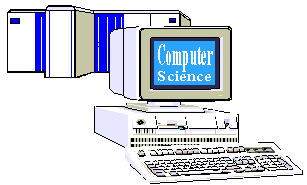Computer Science
The
observation, identification, description, investigation, and theoretical
explanation of devices that compute, specially electronic machines used
for performing high-speed mathematical or logical calculations or assembling,
storing, correlating, or otherwise processing and printing information
derived from coded data in accordance with a predetermined program.
 ometime
during the middle of the Twentieth Century, 'Computer Science' was born.
Diapered and drooling, it scampered through the halls of academe, demanding
attention. In naming the infant, somebody was not sophisticated. ometime
during the middle of the Twentieth Century, 'Computer Science' was born.
Diapered and drooling, it scampered through the halls of academe, demanding
attention. In naming the infant, somebody was not sophisticated.
One thing about computers was not taken into account:
They don't compute! Not in the traditional sense anyway.
Only the smallest fraction of a computer's
time and resources are devoted to "performing high-speed mathematical or
logical calculations..." Computers are nearly always engaged in "...otherwise
processing...information."
 Admittedly
there are some computers that compute: Admittedly
there are some computers that compute:
-
big old 'mainframes' ~~ like what you put around the picture
but not the picture itself,
-
'super-minis' ~~~~~~ an oxymoron, if anybody ever took time
to chuckle about it,
-
'workstations' ~~~ there's a user-unfriendly term ("Stay
in one place and work, damn it!").
'Number crunchers', we still call them. Even so, their real
power is consumed in the shuffling of information into and out of files
and memories. Truth be known: When it comes to crunching, MIPS (millions
of instructions per second) are generally less important than FAPS (file
accesses per second).
Control is by software, itself a labyrinth of information
processing functions. And processing, for the most part, means movement.
 ah!
The computer is a 'bytemobile.' Which reminds me... ah!
The computer is a 'bytemobile.' Which reminds me...
Inside the automobile, a small device measures the distance
passing and, together with the time elapsing, computes miles-per-hour.
But there's much more to the automobile than its speedometer. In proportion
to other functions, a computer computes about as much as your car computes.
Besides, isn't it customary to name sciences for broad categories
of investigation, not just one application of the consequent knowledge?
Using the expression 'Computer Science' to denote the
study of information processing is tantamount to calling 'Mechanical Engineering'
'Automobile Science.'
That we can do better is hardly in doubt. Consider the hundreds
of company names that have been invented in this field. How many of the
following contrivances -- all adapted from company names (vintage late
'80s) -- might have served to name the science?
Acromatics, Actronics, Alcyonics, Algorics, Alphamerics,
Alphametrics, Alphanetics, Anistics, Autronics, Autokonics, Benedatics,
Benetics, Bytelics, Bytronics, Codarics, Compumatics, Conetics, Contelics,
Corticology, Datamatics, Datamation, Datatechnology, Data Trek Science,
Databytics, Dataflow Science, Datafusion, Datalogics, Datamytology, Datanetics,
Dataphasics, Dataphilosophy, Datatechnology, Dataworks, Datransics, Diginetics,
Dyatronics, Dynax Science, Dytronics, Electrodata Science, Execuflow Systems,
Genamation, Genutronics, Infocraft, Infodata Systems, Infologic, Infometrics,
Infospherics, Informatics, Infotechnology, Omnimation, Promation, Savantics,
Velobytics.
'Informatics' is my personal favorite, even though it belongs
to a company. After all, so does 'Computer Science.' The French apparently
agree (Informatique).
 s
for the computer itself, we might have considered such candidates as these: s
for the computer itself, we might have considered such candidates as these:
anatron, aptron, byter, cognitron, conteler, cortexer,
cybertron, datatron, databyter, datajam, datawork, dynatron, flexidata,
geobyte, heuritron, metabyter, maxibyter, novabyter, omnibyter, panatron,
parabyter, polybyter, solutron, spectrabyter, synertron, trilobyter, velobyter,
vitatron, xenobyter.
Most fitting, in my opinion, is 'booler,' honoring George
Boole (1815-1865), the English mathematician who helped to establish modern
symbolic logic. Where, I ask you, would the computer be today were it not
for Boolean Algebra? Booler is short and easy to spell.
The verb forms of 'to boole' sound neat, too: 'booling,'
'booled.'
Too late to change, of course. But back in the fifties, we
might have said, "Think I'll drop by the campus and visit the Informatics
Department. I have some last minute booling to do." Today, a typical 'informatician'
would 'boole' at home on his or her 'personal booler.'
Footnote
For more lamentations about the language of The
Software Age, see Mukashi. The sophisticated
reader intent upon replacing myths with realities may want to take a cybergander
at Software Does Not Fail.
Finally, there's the ironic history in Softword
relevant to the term 'software' itself. {Return}
|
 Admittedly
there are some computers that compute:
Admittedly
there are some computers that compute: